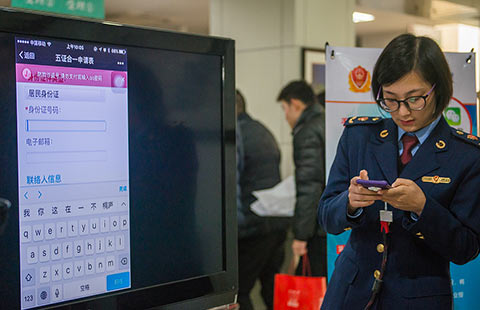And so it begins - Robo-shops taking over China's retail sector
CHONGQING - Paying for your groceries by scanning a QR code on your smart phone is a perfectly normal thing to do in China today.
As cold hard cash vanishes into the mists of time, it seems that the cashiers are about to evaporate too.
Over the weekend, Yiqi Shan, a cashier-free store in Southwest China's Chongqing metropolis, registered its 1,800th sale, two weeks after opening.
The 24-hour convenience store is on the first floor of an office building in an industrial park. It offers various beverages, fast food and snacks in a space of just 12 square meters.
First-time customers sign up by scanning a QR code at the entrance, choosing a password, registering their phone number and submitting a selfie. They are then admitted through a ticket gate similar to those at subway stations.
Scanning bar codes is hardly a highly skilled job and customers - honest customers - can do it just as well as any cashier. When the subsequent mobile payment is complete, another QR code is generated which allows the customer through the ticket gate and out of the store.
Deng Jie, deputy director of the company that owns the store, described three measures that have been taken to prevent shoplifting. First, the customer's selfie is compared with the Public Security Bureau's national ID database.
Second, every corner of the store comes under the steely gaze of surveillance devices that never sleep.
Third, if a customer somehow manages to escape from the store without paying, he or she receives a friendly reminder by text message requesting payment. If the warning is ignored, the customers is banned from the store and a black mark added to his or her personal credit record.
"The cashier-free store is the result of the coming together of new technology and consumer demand," Deng said. Her technical team worked on the app for over three years with 300,000 yuan ($44,000) poured into the project.
Venture capitalists believe cashier-free stores could be "the next big thing," and Deng's company plans to open 25 more this year in various parts of the country, with 200 franchised stores in Chongqing.
Earlier this month, Alibaba opened its first brick and mortar store "Tao Cafe" in the company's hometown, Hangzhou, capital of East China's Zhejiang province. A long queue of curious customers soon formed.
In Shanghai, cashier-free stores are already a part of the landscape. BingoBox Minimarkets, 15-square-meter box, have been installed in many residential communities.
Customers open the door by scanning a QR code, select fresh fruit and daily necessities and check out by e-payment, pretty much a clone of the Yiqi Shan system. There will be 5,000 BingoBoxes in place by the end of August, according to the company website.
The focus of the retail industry is shifting from price to customer experience.
"'Restructuring' could become a key word for retail," said Zhang Yong, CEO of Alibaba. "The flow of production, relationships between sellers and customers, and the shopping experience will be revolutionized to the extent that every customer is identified, understood and served."

























